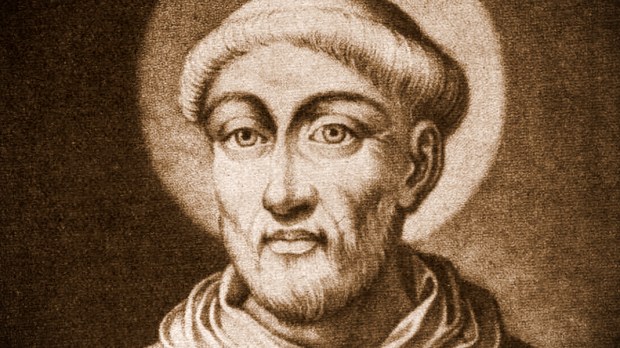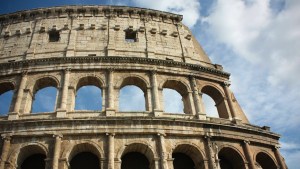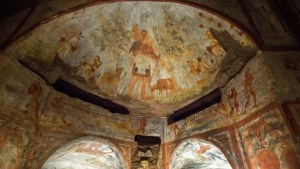Perhaps early evidence that Peter’s successor is appointed by the Holy Spirit despite human scheming and petty calculations can be found in the election of St. Fabian on January 10, 236.
The story, it’s true, is peculiar. At the beginning of 236, Pope Anterus died after a pontificate of forty-two days. He had just succeeded St. Pontian, who had been deported to the mines of Sardinia. The candidates, few in number at the end of 235, were even fewer in January 236: being elected was a guarantee of martyrdom, and this bloody end did not tempt everyone…
The election was public at the time, because there were no conclaves or cardinal electors, and it was the faithful who decided the next pope by acclamation. This sometimes led to bloody brawls between rival factions, and the 236 election dragged on. This didn’t stop the Catholics of Rome from taking a trip to the catacomb where the ballots were taking place to see if things were moving forward.
Chosen by a dove
This is the reason why Fabian, a member of the Roman aristocracy, decided to join the crowd of voters on January 10. A simple layman, he was only a spectator lost in the crowd, and saw that no candidate was receiving the majority of the votes. He was about to leave discreetly when a dove entered through the oculus that provided ventilation to the room.
The bird, disconcerted, flew in circles, bumping into the walls. Even as Christians, the Romans long held onto their sensitivity to omens and signs. The congregation fell silent. Was the dove not the symbol of the Holy Spirit descending on Christ’s head as John baptized him in the Jordan? The bird flew around two or three times, then landed on Fabian’s shoulder.
That’s all it took for the crowd to interpret the incident as Heaven pointing out its chosen one. A joyous cry of “He is worthy!” ratified the vote. Fabian, equally convinced, accepted — layman that he was — this improbable decision. This forced him to receive ordination as a priest and bishop in a hurry in order to become Pope.
What was his life like before? We don’t know. What’s certain is that the story, which Eusebius (a historian of Christianity who lived in the late 3rd and early 4th century) recounts, is authentic. It’s also depicted on a fresco in the catacombs showing the divine bird hovering over Fabian, seated on the pontifical throne.
An excellent administrator
Fabian’s good fortune was to become St. Peter’s nineteenth successor at what would be time of relative peace for the Church. The politically motivated persecution by Maximinus Thrax had effectively ended, and during most of Fabian’s 14-year reign, the Roman emperors paid little heed to Christianity, having other affairs to deal with. The situation improved even more in 244 with the accession to imperial power of Philip, a military officer from what is now Arabia. The new emperor was so friendly to Christians that he was long believed to be baptized.
This assumption was false, but the emperor’s good will was real. Fabian, a member of high society—an interesting detail for this upstart Philip, who had no entry into that world—slipped into the emperor’s entourage and played an effective advisory role, as he was an excellent administrator.
The Church had, of course, been the first beneficiary of this talent. Fabian gave the Roman clergy structures copied from those of the civil administration, appointing seven deacons (from whom the next Pope would normally be chosen) for the seven districts into which he divided the diocese of Rome. He also named sub-deacons, and notaries who were charged with the dangerous task of collecting and preserving the deeds of martyrs.
Unity of Christians
Pope Fabian feared that the progress of evangelization in Gaul, an issue that Rome had been unable to follow, would result in the birth of heretical or dissident communities. Consequently, he chose seven priests from among his clergy, and ordained them as missionary bishops. These men — Saturnin, Denis, Martial, Gatianus, Paul, Trophimus and Austromoine — were charged with laying sound foundations for the new dioceses and continuing the work of Christianization to the north and west.
Affirming Roman primacy and Petrine power, Fabian established himself as the supreme judge and arbiter of church disputes. He was very concerned for Catholic unity, which was suffering from a schism started by Hippolytus, an antipope. He used his influence with the imperial court to bring back from Sardinia not only the body of Pope Pontian, who had died of exhaustion in exile, but also that of Hippolytus. Both had been sentenced to the same punishment in the same camp. Hippolytus, in the face of death, had at last publicly recognized Pontian’s legitimacy. Pope Fabian had them buried side by side in the catacombs, a powerful gesture.
As a legislator, Fabian enacted severe penalties against unworthy and scandalous clerics, forbade marriages between relatives up to the fifth degree, and required the faithful to take communion on at least three major feasts each year. These were important advances.
Things go wrong
Things took a turn for the worse in the summer of 249, when Philip fell victim to a military coup and ended up assassinated. He had deposed his predecessor in exactly the same way.
A product of the Senate, Decius, who seized power, was a conservative who was convinced that the evils eating away at the Empire were the fault of the Christians. He believed they were drawing the wrath of the gods down on Rome, dividing it and weakening it morally.
Without wishing to destroy the Church directly, as several of his predecessors had tried but failed to do, he wanted to recreate national unity by forcing all inhabitants of the Empire to sacrifice to the Goddess Roma. In his mind, this was a simple mark of patriotic support and loyalty in the face of the perils of the day, rewarded with a certificate of civic mindedness.
Decius understood later that, for a consistent Christian, what he was asking for was tantamount to apostasy. The recalcitrants therefore had to be punished. Even many bishops had failed to see the unintentional malice of the measure and willingly complied with this patriotic gesture without measuring its spiritual significance.
Political execution
Because Decius didn’t want to make martyrs, the Church almost disappeared through the effective apostasy of a staggering number of priests and faithful. This earned him the demonic reputation of being Christ’s worst enemy.
Fabian, on the other hand, understood from the outset that to submit to the edict was to deny the faith, and refused to do so. On January 20, 251, he was beheaded, an expeditious measure uncharacteristic of Decius. This proves that the liquidation of the Pope was a political matter, because of his links with Philip and because, with him gone, the Church, deprived of a leader, would no longer resist the State. Thus began one of Catholicism’s worst crises…



